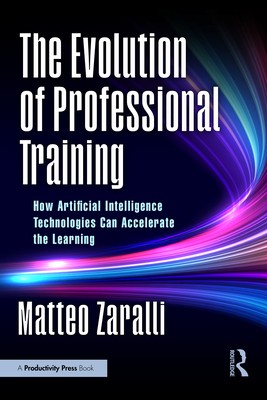
- We will send in 10–14 business days.
- Author: Matteo Zaralli
- Publisher: Productivity Press
- ISBN-10: 1032913584
- ISBN-13: 9781032913582
- Format: 17.8 x 25.4 x 1.1 cm, kieti viršeliai
- Language: English
- SAVE -10% with code: EXTRA
Reviews
Description
Structured into four distinct parts, this book is an indispensable resource for navigating the evolution of education and professional training in the age of artificial intelligence and virtual reality.
The first part begins with an introduction to the current context, a period marked by crisis and a digital industrial revolution, emphasizing how the advent of cutting-edge technologies such as artificial intelligence is fundamentally altering work and social dynamics. It then examines AI, exploring its distinctive features compared to human intelligence and introducing the concept of spatial computing. It illustrates how these technological advancements are expanding the possibilities for human-machine interaction.
In the second part, the focus shifts to artificial intelligence, the importance of data in training intelligent systems, and the emerging concept of the augmented worker. This section explores how AI can enhance human capabilities, facilitate more efficient and personalized learning or training, and promote unprecedented professional development.
The third part ventures into philosophical reflections and ethical considerations regarding the future of work and AI's impact on daily reality. It discusses the changing work paradigm, the challenges posed by increasing digitalization, how AI contributes to an altered perception of truth, and the implications of the multiple digital identities that people can assume in virtual spaces. A task and reflection that businessmen, executives, and managers need to consider.
Finally, the last part emphasizes the critical importance of training, examining how virtual reality and artificial intelligence technologies can accelerate the learning and mastery of hard and soft skills. This section delves into the different sectors that have been or will be transformed by these technologies' integration, offering perspectives on how best to prepare for the challenges and opportunities of the future.
This book is not just an analysis of the impact of emerging technologies on learning and professional development; it is also an invitation to reflect on the future of work, the nature of intelligence, and the evolution of human society in the digital age. Balancing technical insights with philosophical considerations, it targets a broad audience, from educators to professionals, policymakers to the curious, providing tools to understand and navigate the rapid transformations of our time.
EXTRA 10 % discount with code: EXTRA
The promotion ends in 23d.19:33:16
The discount code is valid when purchasing from 10 €. Discounts do not stack.
- Author: Matteo Zaralli
- Publisher: Productivity Press
- ISBN-10: 1032913584
- ISBN-13: 9781032913582
- Format: 17.8 x 25.4 x 1.1 cm, kieti viršeliai
- Language: English English
Structured into four distinct parts, this book is an indispensable resource for navigating the evolution of education and professional training in the age of artificial intelligence and virtual reality.
The first part begins with an introduction to the current context, a period marked by crisis and a digital industrial revolution, emphasizing how the advent of cutting-edge technologies such as artificial intelligence is fundamentally altering work and social dynamics. It then examines AI, exploring its distinctive features compared to human intelligence and introducing the concept of spatial computing. It illustrates how these technological advancements are expanding the possibilities for human-machine interaction.
In the second part, the focus shifts to artificial intelligence, the importance of data in training intelligent systems, and the emerging concept of the augmented worker. This section explores how AI can enhance human capabilities, facilitate more efficient and personalized learning or training, and promote unprecedented professional development.
The third part ventures into philosophical reflections and ethical considerations regarding the future of work and AI's impact on daily reality. It discusses the changing work paradigm, the challenges posed by increasing digitalization, how AI contributes to an altered perception of truth, and the implications of the multiple digital identities that people can assume in virtual spaces. A task and reflection that businessmen, executives, and managers need to consider.
Finally, the last part emphasizes the critical importance of training, examining how virtual reality and artificial intelligence technologies can accelerate the learning and mastery of hard and soft skills. This section delves into the different sectors that have been or will be transformed by these technologies' integration, offering perspectives on how best to prepare for the challenges and opportunities of the future.
This book is not just an analysis of the impact of emerging technologies on learning and professional development; it is also an invitation to reflect on the future of work, the nature of intelligence, and the evolution of human society in the digital age. Balancing technical insights with philosophical considerations, it targets a broad audience, from educators to professionals, policymakers to the curious, providing tools to understand and navigate the rapid transformations of our time.


Reviews